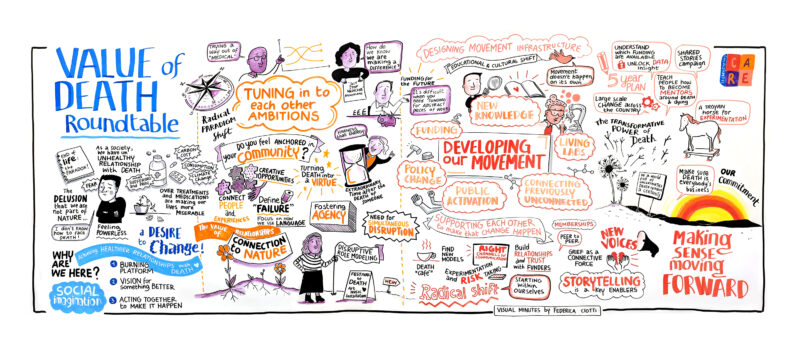Death and dying are a natural process and a universal human experience. Yet how we understand death and how we die have changed remarkably over the past few decades. Death and dying are now predominantly medical events. The customs and traditions that, in the past, prepared us to cope with death have become less common.
Advances in medical science have fuelled an over reliance on medical treatment at the end of life. Not only is this expensive, it means nearly half of all deaths in the UK now occur in hospital despite patients overwhelmingly expressing a desire to die at home.
Avoidance of difficult conversations about death deprives individuals and their families the chance to plan, emotionally and practically, for end of life.
In the past few decades, medical science has rendered obsolete centuries of experience, tradition, and language about our mortality, and created a new difficulty for mankind: how to die – Atul Gawande
Social Finance became interested in this area through our work on social investment in end of life care. We have seen how responsibility for preparing individuals and their loved ones for death often falls upon the health care system. Holistic approaches to caring that focus on improving wellbeing at the end of life are often missing.
Transforming our attitudes towards death necessitates radical systems change, involving interconnected socio-economic, cultural, religious, and political factors that all influence how we perceive, experience and manage death and bereavement.
At Social Finance we have been working with Libby Sallnow, co-commissioner of the Lancet Commission on the Value of Death, to understand how we can bring about such change in the UK.
Under this radical new system, death and dying would be considered part of normal existence and recognised as everyone’s business.
Families and communities would be the main enablers at end of life, with health care playing a supportive role.
End of life care services would be co-designed by social, community and health services to enable people to die well in accordance with their individual preferences. Informal carers would access the support they need, and bereavement services would be commonplace.
Advanced care planning and widespread death literacy would ensure people feel prepared to face death and the complex administration that must be navigated following death.
Priorities for action
Supported by the Q Foundation, we held our first roundtable on The Value of Death in July at St Christopher’s Hospice, London. We brought together a wide range of individuals from both within and beyond the conventional realm of end-of-life care services, including clinicians, experts in community networks and individuals challenging attitudes and approaches to end of life and bereavement services.

Several key themes emerged from the initial roundtable discussions.
- Attracting funding for abstract ideas is difficult but necessary. Building an evidence base and making the most of opportunistic moments is essential.
- Connecting unconnected actors through place-based networks or anchor organisations will facilitate co-production, experimentation and shared learning.
- Policy change is required to prioritise end-of-life and bereavement services and encourage a shift towards more holistic care.
- All actors were keen that death became everyone’s business.
Organisations are already challenging the status quo
Many initiatives already support people through death and bereavement, but we have sought to engage with those trying to do things differently. Most organisations we have engaged with have emerged in response to the extraordinary period following the death of a loved one. They’ve sought to meet a gap in need and provide the kind of support and direction they lacked during and after the death of a loved one.
For example, Untangle is an app that supports people through the emotional, practical, legal and financial challenges that come with a bereavement. A single point of access to peer and professional support, Untangle facilitates access to support wherever you are, whenever you want.
Next steps
We’re excited to continue this conversation, which is why we’re hosting a webinar with the Q community on the 28 September at 12pm. We invite you to bring your experience, ideas, and concerns to what we want to be a collaborative conversation on reimagining death and dying. We want to think about concepts such as healthy dying, priorities for action and how best to engage newer stakeholders in this meaningful work.
Join us on the 28 September at 12pm for an interactive webinar on Reimagining Death and Dying. Please sign up to secure your place.
We look forward to seeing you there and please reach out to us in the meantime if you’d like to hear more about our work. Email bethan.phillips@socialfinance.org.uk.